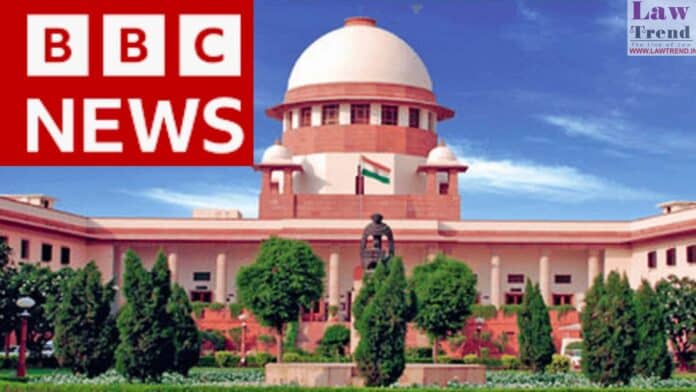The Supreme Court asked petitioners to mention again on Friday for urgent listing of their plea seeking a complete ban on the British Broadcasting Corporation in India for its controversial documentary on the 2002 Gujarat riots.
A bench headed by Chief Justice D Y Chandrachud told the lawyer appearing for the petitioner to mention the matter on Friday.
The top court was hearing a plea filed by Vishnu Gupta, president of Hindu Sena, and Beerendra Kumar Singh, a farmer, which has also sought investigation against BBC and its employees.
Alleging that BBC has been biased against India and Indian government, the plea said the documentary on Prime Minister Narendra Modi is result of deep conspiracy against global rise of India and its prime minister.
“The documentary film by BBC relating to Gujarat violence 2002 implicating Prime Minister Narendra Modi is not only reflective of anti-Narendra Modi cold propaganda broadcast to tarnish his image alone but this is anti-Hinduism propaganda by BBC to destroy the social fabric of India,” the plea said.
On January 30, the top court had said it will hear next Monday pleas challenging the Centre’s decision to block a controversial BBC documentary on Prime Minister Narendra Modi and the 2002 Gujarat riots even as Law Minister Kiren Rijiju attacked the petitioners for “wasting precious time” of the top court.
Taking note of the submissions of lawyer M L Sharma and senior advocate C U Singh, appearing for veteran journalist N Ram, TMC MP Mahua Moitra and activist lawyer Prashant Bhushan, seeking urgent listing of the petitions against the Centre’s ban on the two-episode BBC series using its emergency powers, a bench headed by the Chief Justice had said it will hear the matter on February 6.
The plea has also sought quashing of “all orders directly or indirectly censoring” the information including those shared on social media.
The plea claimed that the BBC documentary has “recorded facts” which are also “evidence” and can be used to further the cause of justice for the victims.
On January 21, the Centre issued directions for blocking multiple YouTube videos and Twitter posts sharing links to the controversial documentary.




